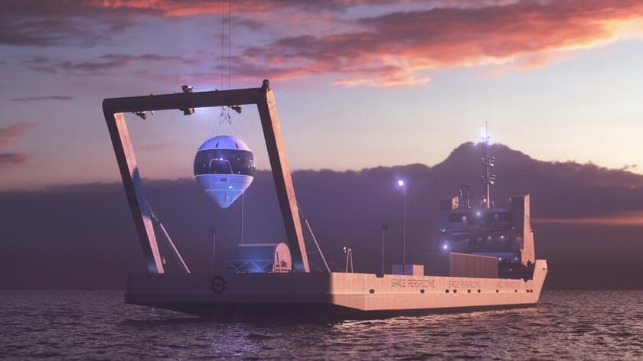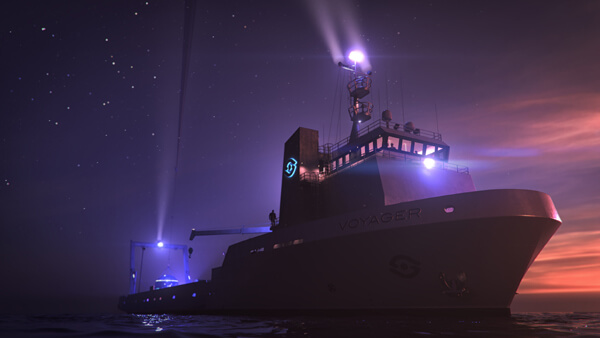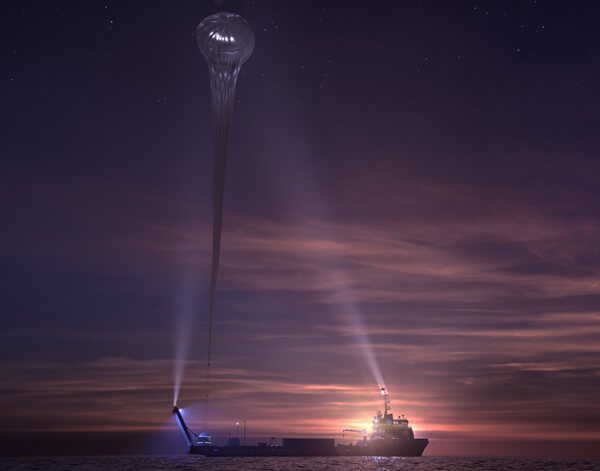Former Edison Chouest OSV Being Converted to Host Space Flights

A former offshore supply vessel is reportedly destine to become the world’s first marine spaceport for human spaceflight. Classification society ABS reports that it is supporting the planned reactivation and modifications to the 25-year-old vessel, which is expected to be operational later this year as part of test flights in advance of an anticipated 2024 commercial launch.
The latest space tourism concept is being presented by a Florida-based start-up called Space Perspective. In their plan, the spacecraft, called Spaceship Neptune, will be launched for a six-hour journey to space providing a spacious consul for eight passengers and a captain. Unlike the operational space tourism flights, this one calls for the pressurized capsule to be attached to a massive hydrogen-filled balloon to provide a gentle ascent that the company compares to being in an airplane.
The OSV C Challenger, which was built in 1998 and operated by Edison Chouest Offshore in the Gulf of Mexico supporting the offshore oil sector, was acquired by Space Perspective in November 2022. The company reported that the 292-foot vessel would be renamed MS Voyager in honor of the NASA space probe of the same name. The 3,094 dwt vessel is currently in Louisiana with ABS reporting modifications are already underway.

ABS is supporting the conversion of the Edison Chouset OSV into the future marine spaceport (Space Perspective)
In addition to conducting launches from shore, Space Perspectives says the Voyager would be used for launches from approved offshore locations. Initially, the ship would be homeported in Port Canaveral, Florida as the homeport for flights, but the company also looks to use the ship for flights from the Gulf of Mexico and the Caribbean. In addition, according to the company’s presentations, plans are underway to integrate marine-based launches into marquee global events, and conversations are active with several potential destinations across the globe. They are planning a fleet of ships to support the marine launches.
“We always imagined offering the opportunity to view the most incredible natural phenomena from space, including the Northern Lights, the boot of Italy, the sheer scale of the Nile Delta, and the deep blue seas around the Bahamas. Marine Spaceports like MS Voyager make this a reality,” said Jane Poynter, Space Perspective’s Founder and Co-CEO announcing the acquisition of the OSV.
The Voyager would be positioned in an approved offshore location, where the balloon will be filled with hydrogen and the trip would begin reaching a height of 20 miles above the earth’s surface. At the end of the six-hour flight, the capsule will splash down in the ocean and be retrieved by the Voyager.
To make this possible, the plan calls for modifications to the vessel which will include the addition of a launching system and an A-frame that would hold the capsule. The Voyager will support fast boats that would be used in the recovery operation before the capsule is raised back aboard with the A-frame.

The balloon and capsule would launch offshore from the OSV and be retrieved after splashdown (Space Perspective)
“The future of space travel is on the water. MS Voyager unlocks flexible launch locations, ideal launch conditions, and more frequent launch opportunities. Our collaboration with the experts at ABS is helping us make space travel more accessible to the world than ever before,” said Founder and Co-CEO of Space Perspective Taber MacCallum.

that matters most
Get the latest maritime news delivered to your inbox daily.
Space Perspective reports that the Conrad Shipyard will be carrying out the outfitting of the vessel with the assistance of Gulf Ship. ABS is providing class, engineering review, and regulatory services for the MS Voyager.
Last year, the company reported reservations were being accepted for flights at the cost of $125,000 per ticket. Testing of the flight concept is scheduled for 2023 according to the company’s website. They said the target is to begin the first commercial flights in 2024.
